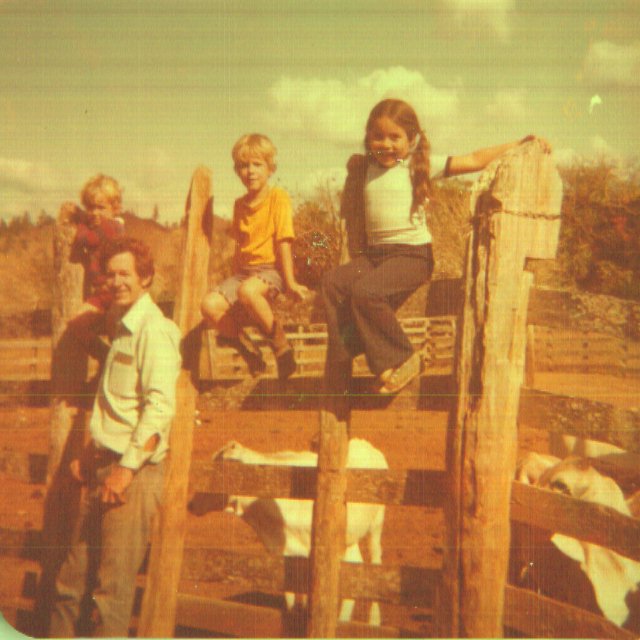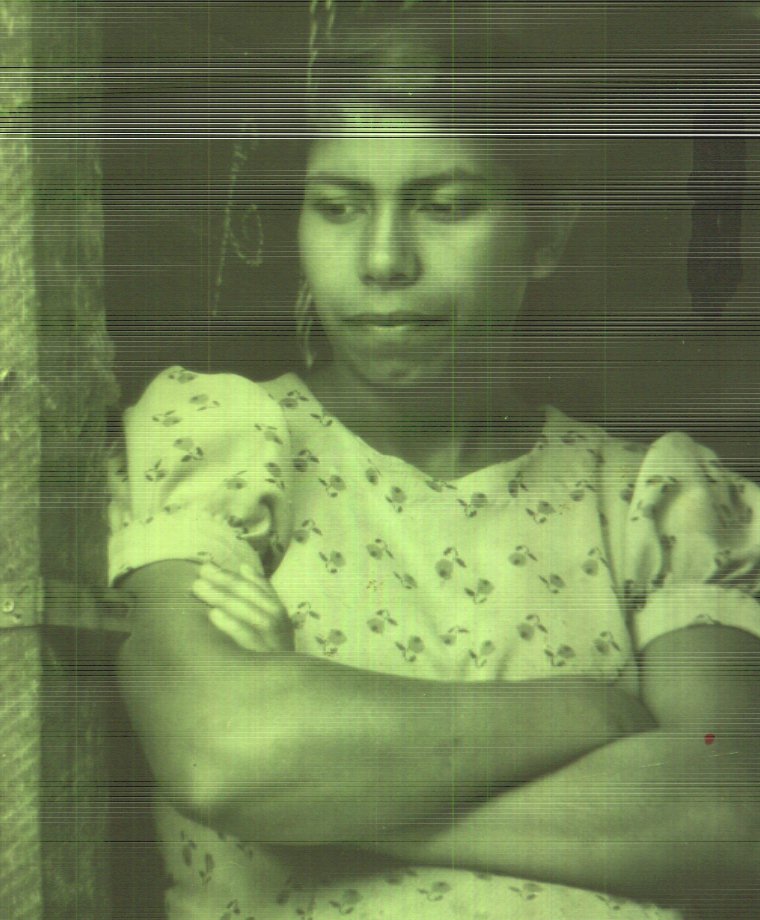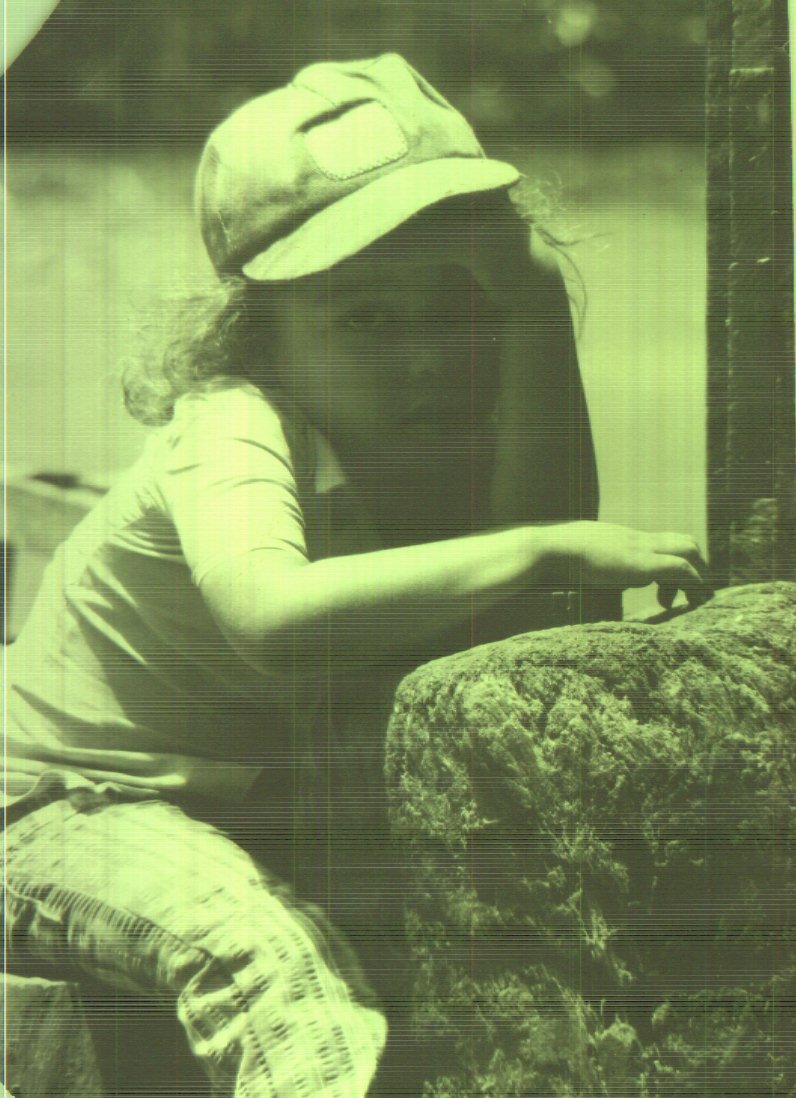 The
Ninth Year (1979): January to July, The Revolution Rages
The
Ninth Year (1979): January to July, The Revolution Rages
January 1: Tonight we have supper with our closest neighbors - a fine old farming couple, here in Monteverde -- and tomorrow we blast off to parts unknown. The border is open one day and closed the next, but we still plan to try to get to our farm. If we can't make it, we'll probably tour around Costa Rica for a while and come back to Monteverde for no end of projects we have going here.
We've moved into a rustic, no-electricity place on the far outskirts of the community. From our front porch we look 100 miles out to the Bay of Nicoya, a mountain range, and a glimmer of the Pacific Ocean beyond and almost every night a fiery setting sun. In between the water and our cliff edge are sloping valleys speckled with white cattle and patchwork farms down on the plains. It's not just the view that we love; it's even more the whole feel of independence. The boys are great about making the 1 to 2 mile walk to the school, which is really the center of the community.
February 27: We are back in Monteverde, after two months in Nicaragua. Yesterday morning we got up at 3am, milked the cows and took off in our little Toyota pickup, headed south. Five army barricades later, at 2pm, we crossed into Costa Rica. And by 11pm, the same day, we arrived at our cliff edge house here in Monteverde. Tired, yes - but very happy to have made the trip successfully.
We spent January and February at Sangarro working on the farm, as only we work on that precious farm, yet, all the while, soaking up impressions of the war there by means of looking, talking with neighbors, and listening to the radio. Assuming Nicaragua has a future, and we are part of it, our time at the farm was well spent. With Raphael and Licha's help we picked and sold the coffee crop, cultivated and fertilized all of the coffee (5,000 trees), sold our excess cattle, built a new corral, and did the 100 and 1 other jobs that needed doing. Our only real social outing was riding the 5 miles down to Abran and Christina's and jointly celebrating the birthdays of Teo and their daughter, Marcella.
The colt that we bred and raised is now a fine young horse and was Teo's delight much of the trip. He looked so little perched up on that big fellow and yet he learned enough to basically handle the horse. Machua spent most of his time playing with Juancito, riding stick horses and working out a language somewhere between English and Spanish.
Nicaragua is indeed involved in a vicious civil war. Heavy fighting took place last September and we drove through one of the towns nearest us, Esteli, to see if it was true, that the town had been basically destroyed by government planes bombing to root out the revolutionaries. It was true. Right down the main street, all the former business establishments were nothing but piles of rubble. During that time most of the major cities became deserted as people fled to the countryside and to Costa Rica and Honduras to escape the conflict.
Since September, and General Somoza's declaration through action that, number one, he does have firm control of the army and number two, that he will use that control to destroy Nicaragua before he is pushed aside by anybody, the fighting has been strictly scattered with revolutionaries throwing bombs here and there, ambushing army trucks and army outposts and committing at least three robberies everyday (which has created havoc in business). Meanwhile the army, through propaganda and high pay has been doubled in size and some way or another acquired very good armaments and is diligently working all over the country arresting suspects, killing and raping and effectively spreading both great hate and great fear.
In our own area six people have been killed in the last two months, one being the young man, Chepe, who we knew well and who developed a crush on Kimberly while she was at the farm. Another is an old man, who lives near the border, who was not only killed but also castrated and quartered. He was found with a supply of ammunition and may well have been buying for some revolutionaries hiding near by in Honduras. In addition a dozen local boys have fled to Honduras to "join up with the revolutionaries."
During the last year our house was entered on one occasion by the revolutionaries and on another by the army. Nothing much was disturbed. During the time we've been here, only a few neighbors have passed by. We were thankful, selfishly, that no encounters took place nearby while we were at the farm. And as a result, except for the fear, everything on the farm was absolutely normal. And beyond the farm everyone was busy harvesting the coffee crop and bitching about the low prices being paid, except for isolated places, where someone was being searched and killed and seldom reported in the news.
Personally I despise the privileged position of the Nicaraguan army and their violent use of force and of the rich who back them. It is a paradox that the triggers are being pulled mainly by poor kids, who want the pay and enjoy the power, while other kids are getting off on the excitement of shooting from the other side. For many reasons I am behind the revolutionaries, but the building of a better society will be much more difficult than toppling Somoza and not nearly as exciting and will probably not happen in Nicaragua in the near future. And I think some of the worst of the human scene is now happening in Nicaragua. Yesterday it happened in Germany and Vietnam and Watts. And it may happen tomorrow in Costa Rica or even Omaha.
On our little farm in Nicaragua, I believe there are small things we can do to influence the course of events there. From afar there is little one can do, but for us to propagandize publicly, either our thoughts or impressions, might backlash on our friend Raphael or our neighbors or ourselves.
For now we are back in our Monteverde reality and ready to start teaching and running a woodworking shop and participating in the community functions. What a contrast we have found to Sangarro!
 June
11: I have just returned from one month in Nicaragua. I went because
I felt the family taking care of our farm needed my support and also to
learn more about what is happening within that poor country. Raphael was
out of money and much appreciated my coming. Mostly what I did during
the month was just work with Raphael in doing everything that needed to
be done on the farm, which consisted mainly in planting 2,000 new coffee
trees. We had beautiful weather and beautiful rains for doing the work.
Some of our neighbors were short on food too and I helped them in little
ways and gave Raphael permission to distribute the bananas in such a way
as no neighbors would starve. As poor as we are we are still rich compared
to all of our neighbors not counting the rich ones! The very richest one,
has sold everything he had except his land, and taken his whole family
to the U.S.
June
11: I have just returned from one month in Nicaragua. I went because
I felt the family taking care of our farm needed my support and also to
learn more about what is happening within that poor country. Raphael was
out of money and much appreciated my coming. Mostly what I did during
the month was just work with Raphael in doing everything that needed to
be done on the farm, which consisted mainly in planting 2,000 new coffee
trees. We had beautiful weather and beautiful rains for doing the work.
Some of our neighbors were short on food too and I helped them in little
ways and gave Raphael permission to distribute the bananas in such a way
as no neighbors would starve. As poor as we are we are still rich compared
to all of our neighbors not counting the rich ones! The very richest one,
has sold everything he had except his land, and taken his whole family
to the U.S.
The country is in a terrible and tragic state. The crisis is now at its
highest point, so maybe there is a chan ce
of change. But having seen the strength of Somoza's army with my own eyes,
it is possible that the struggle may go on for a long time yet. Change
will probably take the from of socialist/communist and will fall hard
on Yankees, but then as a government we deserve it for not having had
more vision and understanding of Somoza a long time ago. I sure hope that
changes will bring more justice and a better way of life to more people
- the situation could hardly be any worse. I'm not sure if we can participate
in these changes or not.
ce
of change. But having seen the strength of Somoza's army with my own eyes,
it is possible that the struggle may go on for a long time yet. Change
will probably take the from of socialist/communist and will fall hard
on Yankees, but then as a government we deserve it for not having had
more vision and understanding of Somoza a long time ago. I sure hope that
changes will bring more justice and a better way of life to more people
- the situation could hardly be any worse. I'm not sure if we can participate
in these changes or not.
Two of our neighbors were shot to death and left in a ditch by the army for having written a letter to the national newspaper describing how the army had killed their father. Everyone is frightened, but up to now, no fighting has happened right in our area.
Last Thursday, when I was ready to leave, there was almost no way to
do so. No buses, no traffic,  no
open borders, no airplanes, so I finally tested our Honduran escape route.
I simply took off toward the north on jungle trails and four hours later
was on a Honduran bus headed toward Tegucigalpa. At the airport I explained
my illegal entry and they stamped me on through on a flight over Nicaragua
back to Costa Rica. And it feels very good to be back with Elizabeth,
Teo and Mach who are all fine and glad to see me too. Only thing is that
I'm not too excited about this job here anymore and may be making some
plans to do something else soon.
no
open borders, no airplanes, so I finally tested our Honduran escape route.
I simply took off toward the north on jungle trails and four hours later
was on a Honduran bus headed toward Tegucigalpa. At the airport I explained
my illegal entry and they stamped me on through on a flight over Nicaragua
back to Costa Rica. And it feels very good to be back with Elizabeth,
Teo and Mach who are all fine and glad to see me too. Only thing is that
I'm not too excited about this job here anymore and may be making some
plans to do something else soon.
Seems that our little "Sangarro" dream sure went to hell. The farm was as pretty and productive as ever. Anyway the real fun was doing it. We sure have learned a thing or two, which I don't think qualifies me for any jobs!
July 1: We are still in Costa Rica and all fine. I have been in San Jose for a week doing paper work and trying to sell our little red truck. No luck so far with the truck. Our future plans are in a state of chaos. But we are definitely thinking of returning to the U.S. and settling down there!
July 2: Since yesterday several things have happened. A lady from Monteverde passed by with a note from Elizabeth saying that she and the boys will be down here on Thursday. I met an Italian/Brazilian news reporter who wants me to take him into Nicaragua! And I met a fellow who wanted to buy the truck. I have been working the last three hours on the paper work for selling the truck. The fellow has put down a good hunk of money so I know it's sold. That was good luck! I have to drive the truck over to the Caribbean side to his beachfront farm when we get the paper work done. I also wrote the U.S. President, pleading that no more arms get into the hands of the Somoza regime, telling him that some of my neighbors had been killed by U.S. arms and also encouraging him to recognize the new Nicaraguan provisional government and to force Somoza out.
I guess my letter worked because Somaza fled the country and the Sandinistas
declared victory on July 19, 1979!